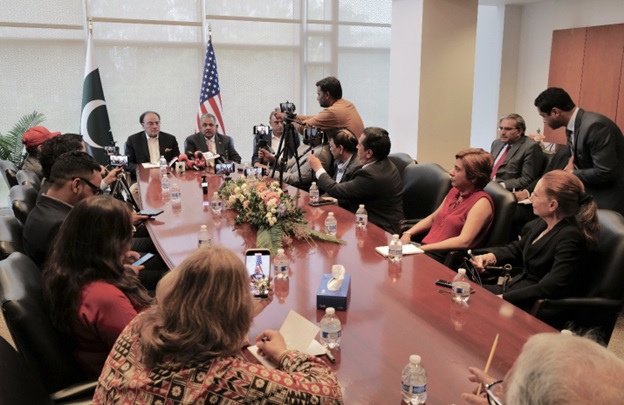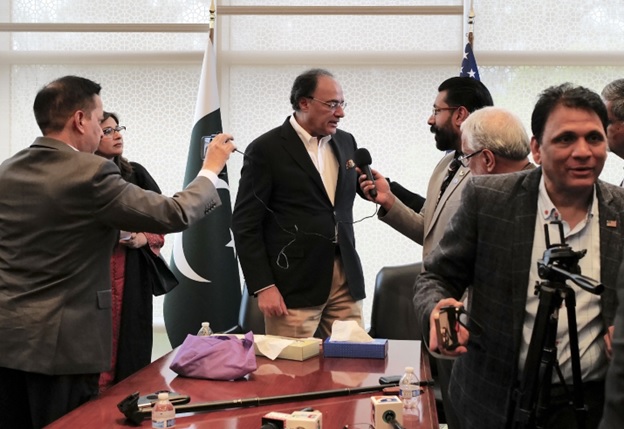


Pakistan Needs to “Stay the Course” following Successful Reforms
By Elaine Pasquini
Photos by Phil Pasquini
Washington: Briefing reporters following a successful week of meetings at the International Monetary Fund (IMF) and World Bank Group Spring session the week of April 21, 2025, Pakistan’s Finance Minister Muhammad Aurangzeb cited a litany of goals met since the 2024 meetings and areas of improvement still needed.
“Inflation has been a fantastic story,” he said, with numbers down from 38 percent last year to 0.7 percent at the present time. Macroeconomic steadiness and stability of the currency have improved, but translating these achievements into making a real difference in terms of the life of the average person is a top priority.
Due to successful reforms, Fitch ratings agency recently upgraded Pakistan, an indicator the country is moving in the right direction. “From my perspective and the government’s perspective this is a very important external validation,” Mr Aurangzeb said.
With respect to macroeconomic stability, in the past Pakistan has gone through boom-and-bust-cycles. “There’s a reason we’ve had 24 IMF programs. It’s because we don’t follow through and we don’t follow up on what we have said we will do,” he pointed out.
Two major priorities are a growing population which is not sustainable and climate change. “It’s not about extreme weather patterns; it’s not about episodic incidents which we experienced in the past,” he said. “It’s that we are living every day with hailstorms and extreme heat.”
The finance minister enumerated the areas needing reform, which include tax reforms, energy, state-owned enterprises (SOEs), pension reform, privatization and public finance, including right-sizing of the federal government. And debt servicing, he noted, is the single-largest debt cycle for Pakistan.
The long-term problems of fiscal deficit and the current account deficit, however, are improving, he added.
Since last April, however, reforms have been made in these areas. “We said we would engage with the Fund because we want to do these things,” Mr Aurangzeb said. The government’s achievement of these reforms is corroborated through Fitch’s rating upgrading of Pakistan. “It’s a good validation in terms of our direction,” he enthused. “But we have a long way to go.”
In addition, the private sector needs to be leading the country, which Mr Aurangzeb believes everyone is in agreement on as being the right thing to do.
He stressed the importance of remittances, which he termed the “lifeline of the country,” and expressed his gratefulness to the large Pakistani diaspora around the world for their generous assistance.
The finance minister went on to point out the ongoing diversification in export markets, which include textiles, IT services, agriculture, pharma and automobile manufacturing, noting that for the first time cars have been exported to Africa.
With respect to foreign direct investment, “minerals and mining are a game-changer for us,” he said, mindful of the successful Pakistan Minerals Investment Forum held in the Jinnah Convention Centre in Islamabad three weeks ago. Delegations from many countries attended, including from the United States, which he believes is indicative of improving trade relations.
With respect to interactions with Saudi Arabia, United Arab Emirates, China, UK and Türkiye, he voiced his appreciation for the compliments from these multilateral and bilateral partners, including the US administration, with respect to the transformation that has happened in Pakistan in only 14 months. They all acknowledged “our direction of travel is good.”
The other consistent message from Pakistan’s international partners was: “stay the course.” Mr Aurangzeb agreed that “this is the right thing to do as we go forward because we need to get on to a sustainable growth path. We cannot afford to squander this fantastic opportunity.”
“I think we should acknowledge and cherish this kind of relationship that we have where they are supporting us on this journey…and that this is, indeed, the last [IMF] program and we move forward,” he said.
“I think it is time we stand on our own,” the finance minister stated. “This is an opportunity for us to stay the course. We are on a good trajectory.”
(Elaine Pasquini is a freelance journalist. Her reports appear in the Washington Report on Middle East Affairs and Nuze.Ink.)

